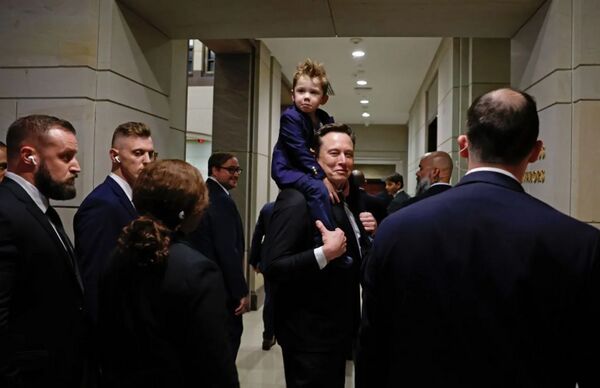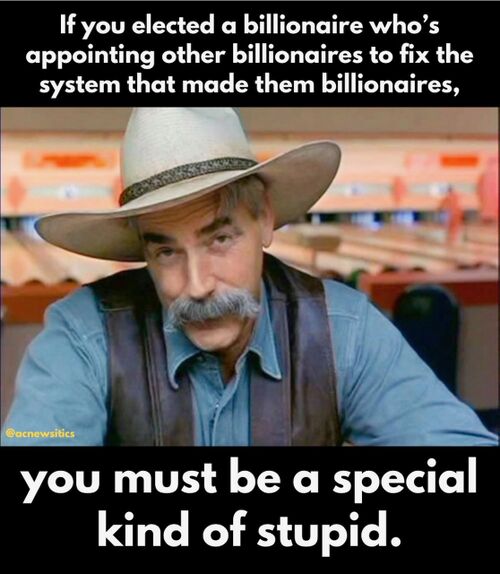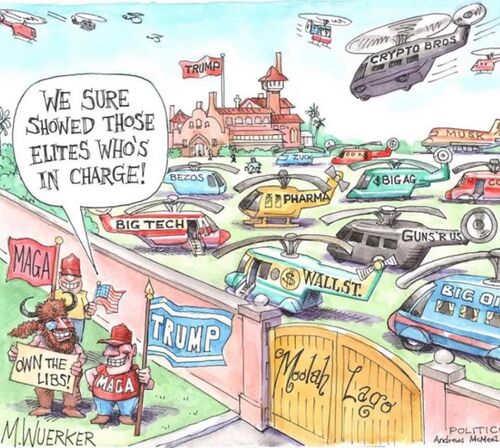Real Bond Villains (Or, There’s No Such Thing as a Moral Billionaire)
Billionaires aren’t just wealthy individuals—they’re a symptom of deeper societal issues. The existence of billionaires is not just controversial but deeply immoral. Their wealth isn’t just a reward for their supposed hard work or innovation; it’s tied to exploitation and systemic inequities that hurt the workers—i.e., the rest of us. For example, Elon Musk’s influence over elections, Donald Trump’s proposed cabinet of billionaires, and the for-profit healthcare system as a model for what all public services could become make it clear that billionaires harm democracy, widen inequality, and perpetuate an unjust, capitalist (is that redundant?) system.
When billionaires like Musk wield their wealth like a cudgel, they distort democratic processes. Musk’s purchase of Twitter gave him a platform to amplify his views and shape political discourse.[1] Musk’s control of the platform has been used to promote candidates and policies aligned with his interests, undermining the principle of one person, one vote.[2] Musk’s involvement in the recent election illustrates how billionaires use their financial clout to sway outcomes. According to Bryan Metzger, Musk’s America PAC funneled millions into political campaigns and weaponized his platform to elevate narratives beneficial to his personal and business interests.[3] This isn’t just an ethical issue; it’s a systemic problem. Capitalism, by concentrating power in the hands of the few, naturally erodes democracy. When billionaires control media platforms and fund political campaigns, elections become battles of wealth, not ideas.

And now with Trump poised to return to the White House, concerns mount over Musk’s supersized influence on the administration’s policy directions.[a] Bernie Sanders recently blasted Musk, accusing him of acting as a puppetmaster behind the tanking of a bipartisan government funding bill.[7] This development signals a concerning, but not unsurprising, trend: billionaires using their financial and political clout to shape national policy to their advantage. Musk’s involvement in the Trump administration goes beyond donations or lobbying—it’s a direct hand in crafting legislation. The ruling class (oligarchs) uses its economic power to protect and expand its dominance, even at the expense of democratic processes.
Musk’s influence extends to environmental policy as well. While Tesla markets itself as a leader in green technology, critics argue that the company’s reliance on subsidies and tax incentives undermines the broader fight against climate change. Trump’s administration, influenced by Musk, is expected to push for “market-friendly” environmental policies that prioritize corporate profits over meaningful climate action.[8] This is particularly ironic, given Musk’s public cosplay as a visionary dedicated to saving the planet.
Conflicts of interest are already blatantly obvious in Musk’s dual roles as a business leader and a government advisor. His involvement in policy discussions could lead to decisions that benefit his companies, such as Tesla and SpaceX, raising ethical questions about the intersection of private interests and public policy.[9]
Donald Trump’s penchant for surrounding himself with the ultra-wealthy is well-documented, and his upcoming cabinet signals a continuation—if not an escalation—of plutocratic governance. According to a recent report by The Guardian, Trump’s new cabinet will feature an unprecedented number of billionaires and corporate elites.[10] Figures like Ken Griffin, a hedge fund tycoon with a net worth of over $30 billion, are poised to take on key roles, cementing a government that serves the interests of the elite rather than the working class. Griffin, a potential nominee for Treasury Secretary, has long been a critic of regulations designed to protect consumers and workers, instead advocating for policies that favor Wall Street and the financial sector.[11] His leadership could herald further tax cuts for the rich and deregulation of industries, worsening wealth inequality. Such appointments are not coincidences—they are deliberate actions by the ruling class to preserve and expand their dominance.
Another notable pick—another booger out of ’Rump’s nose—is Vivek Ramaswamy, a biotech entrepreneur, as co-billionaire in charge of DOGE.[4][b] Ramaswamy, whose career has revolved around pharmaceutical profits, has openly supported policies that prioritize innovation over affordability in drug pricing.[12] His appointment would likely embolden the for-profit healthcare system, further deepening the crisis for millions of Americans who struggle to afford basic medical care.
These appointments follow the pattern established during Trump’s first term, when his administration was dubbed the “Billionaire Boys Club.” Figures like Betsy DeVos and Wilbur Ross shaped policies that benefited the wealthy at the expense of ordinary Americans. Trump’s second term appears poised to double down on this approach, embedding billionaires across key government positions to further entrench plutocracy.[13]

The growing trend of privatizing public services, driven by billionaires and corporate elites, exemplifies how plutocracy harms the working class. Privatization transfers control of essential services—like healthcare, education, and utilities—from public, democratic institutions to private entities that prioritize profit over public welfare. For-profit healthcare, in particular, illustrates the unnecessary and damaging impact of this approach, as it creates perverse incentives for owners and executives to maximize profits at the expense of the people who rely on these services.
The recent killing of UnitedHealthcare CEO Brian Thompson by Luigi Mangione has sparked intense debate and highlighted deep-seated frustrations with the for-profit healthcare system. Thompson was fatally shot on December 4, 2024, outside the New York Hilton Midtown hotel, where he was scheduled to attend an investor meeting.[c] Mangione was apprehended after a five-day manhunt and has been charged with first-degree murder as an act of terrorism.[14]
Public reaction to the killing has been notably divided. While many condemn the act of violence, a significant portion of the working class has expressed tacit responses, with some viewing Mangione’s actions as a manifestation of widespread anger toward the inequities perpetuated by the privatized healthcare system. An Emerson College poll revealed that 41% of young Americans (aged 18-29) believed the killing was justified, and another 19% remained neutral.[15]
UnitedHealthcare’s practice of denying coverage inflicts significant harm on individuals, leading to emotional distress, financial devastation, and loss of life. Such actions are a form of institutional violence, where systemic policies result in harm to vulnerable populations. For instance, a 2023 lawsuit alleges that UnitedHealthcare used an AI algorithm with a 90% error rate to deny care to elderly patients, prioritizing cost savings over patient well-being.[16] Additionally, reports have highlighted instances where patients suffered adverse health outcomes due to delayed or denied coverage, underscoring the life-threatening consequences of such practices.[17] These denials not only undermine trust in the healthcare system but also perpetuate inequities, disproportionately affecting those who are already marginalized.
The government’s decision to charge Mangione with terrorism-related offenses further underscores the systemic bias favoring the wealthy elite.[18] By labeling the act as terrorism, authorities prioritize the protection of corporate interests over addressing the underlying societal grievances that led to such an extreme act. This response exemplifies how the state apparatus often functions to uphold the status quo, safeguarding the interests of the plutocracy at the expense of the working class.
The for-profit healthcare system in the United States has long been criticized for prioritizing profits over patient care. Private equity firms have increasingly acquired hospitals and healthcare facilities, implementing cost-cutting measures that can compromise patient outcomes. For instance, the closure of emergency rooms in rural areas due to profitability concerns has left many communities without immediate access to critical care.[19]
Pharmaceutical companies have also come under scrutiny for exorbitant drug pricing. The high cost of essential medications, such as insulin, has led to patients rationing doses or foregoing treatment altogether, sometimes with fatal consequences. This profit-driven approach exacerbates health disparities and places undue financial strain on individuals, particularly those from lower socioeconomic backgrounds.
The privatization of healthcare services introduces a profit motive that leads to decisions detrimental to patient care. When healthcare is treated as a commodity, access and quality become secondary to financial considerations, undermining the fundamental principle of healthcare as a human right. The events surrounding Thompson’s death and the subsequent legal actions against Luigi Mangione highlight the deep societal rifts caused by the commodification of essential services. Addressing these issues requires a critical examination of the structures that allow for such disparities and a concerted effort to prioritize the well-being of all citizens over the financial interests of a privileged few.
The privatization of healthcare is not only harmful but entirely unnecessary. Many countries with publicly funded healthcare systems, such as Canada and the United Kingdom, deliver care that is both more affordable and accessible than the U.S. system. These systems eliminate the profit motive, focusing instead on providing care based on need rather than ability to pay.
Yet, in the U.S., privatization persists because it enriches those at the top. Billionaires and corporate executives lobby aggressively to maintain the status quo, ensuring that the working class continues to foot the bill for their profits. This dynamic perpetuates class inequality: the ruling class uses its control of essential industries to extract wealth from the proletariat, solidifying its dominance.
Watch out, USPS, you’re next.[20]
Privatizing public services doesn’t just harm individuals—it weakens society as a whole. When profit is the driving force behind essential services, inequality grows, trust in institutions erodes, and social cohesion breaks down. People begin to see their government not as a guarantor of their rights but as a facilitator of exploitation. This fuels cynicism and disengagement, further empowering the billionaire class to shape policy in their favor.
For example, public disillusionment with the U.S. healthcare system has grown as more people face crippling medical debt. Instead of demanding reforms, many feel powerless, believing that change is impossible under a system so deeply entrenched in privatization and plutocratic control.
OK, what was I talking about? Oh, yeah, billionaires as Bond villains.

Billionaires are products of an exploitative system. Their wealth is not created in isolation; it is extracted from the labor of countless workers. Musk’s fortune, for example, is built on the labor of Tesla’s underpaid factory workers, many of whom have reported unsafe working conditions and attempts to unionize being met with retaliation. Similarly, the fortunes of pharmaceutical billionaires are accumulated through the commodification of life-saving medications, which should be a public good but are instead treated as luxury items for profit maximization.
From a moral standpoint, the existence of billionaires represents a failure of society to equitably distribute resources. Wealth inequality is not a natural or inevitable phenomenon, but the result of deliberate economic structures that prioritize private ownership of the means of production. The immorality lies not only in the excesses of billionaires but also in the systemic exploitation and alienation required to sustain such wealth. Every dollar hoarded by billionaires is a dollar that could have been used to provide healthcare, education, or housing for those in need.[d]
The abolition of billionaires is not merely a radical demand but a logical step towards addressing systemic inequality. The transition to a more just society requires the collective ownership of the means of production and the redistribution of wealth to meet human needs rather than fuel individual greed. This would entail progressive taxation, robust labor protections, and the nationalization of essential industries like healthcare, energy, and a clean environment.
The existence and influence of billionaires are inherently immoral. Figures like Elon Musk and Donald Trump, along with systems like for-profit healthcare, demonstrate how billionaires undermine democracy, exacerbate inequality, and perpetuate exploitation. These issues are not isolated; they are structural, reflecting the contradictions of capitalism itself. To build a just and equitable society, we must confront and dismantle the systems that enable and celebrate billionaire wealth. Only then can we hope to create a world where resources are distributed based on need rather than greed.
Finally (I know this post has grown out of control), Luigi Mangione’s actions may resonate with those who see him as a symbol of resistance against a system that deals in “delay, deny, defend.”[21] The inequality perpetuated by UnitedHealthcare and other for-profit institutions fosters anger and desperation among the working class, many of whom view the denial of healthcare as a direct assault on their dignity and survival.
For people burdened by medical debt, denied care, or forced to watch loved ones suffer due to unaffordable treatments, Mangione’s targeting of a corporate executive could be interpreted as an act of defiance—a rebellion against a system they perceive as violent in itself. Structural violence, such as UnitedHealthcare’s denial of coverage, leads to preventable deaths, financial ruin, and emotional trauma, creating an environment where radical actions may be framed as revolutionary rather than criminal.
Historical parallels can be drawn to figures who have challenged oppressive systems, often gaining grassroots support despite their controversial methods. Mangione’s act, particularly against the backdrop of systemic healthcare inequities, could inspire a narrative where he is seen not as a criminal but as a martyr or freedom fighter standing up for the majority. This sentiment is magnified by the government’s response, charging Mangione with terrorism—an act that reinforces the perception that the state protects corporate elites over the public. For those suffering under these systems, Mangione’s actions, however violent, may appear as a desperate attempt to demand accountability where none exists.
This framing highlights the dangerous cycle of systemic oppression and retaliation: as inequality grows and public grievances go unaddressed, individuals like Mangione may emerge as symbols of resistance, reflecting the frustrations of a disenfranchised majority.
How’s that for a morality check? Have you ever shed a tear for the demise of a Bond villain?
references
- ↑ After the election, the country’s ten richest people saw their wealth increase by $64 billion, with Musk being the largest beneficiary of Trump’s win with $26 billion.[5] Musk is on-track to be the world’s first trillionaire by 2027[6]—truly approaching Hugo Drax levels of Bond villainy.
- ↑ Seriously, Trump cannot just make a “Department of Government Efficiency”—that’s the job of congress. And how ironic that Trump thinks a new department, run by two billionaires, needs to be created for efficiency. And these billionaires are going to be making decisions that will affect the poorest of us? It would be hilarious if not so appalling.
- ↑ Oh, don’t worry, investors stepped over the corpse of the CEO and held their important meeting anyway!
- ↑ I saw a meme recently that suggested if an ape hoarded all the bananas it could find resulting in the harm to the community of apes, scientists would classify this ape as an anomaly. Yet, we humans celebrate those greedy apes for some reason.
- ↑ Taddonio, Patrice (19 November 2024). "Flashback: Inside Elon Musk's Mounting Political and Cultural Influence". PBS News. Frontline. Retrieved 2024-12-18.
- ↑ Elliott, Vittoria (21 October 2024). "Elon Musk's America PAC Has Created an Election Denial Cesspool on X". Wired. Retrieved 2024-12-18.
- ↑ Metzger, Bryan (6 December 2024). "Elon Musk spent at least $277 million backing Trump and the GOP. Here's where all that money went". Yahoo! News. Retrieved 2024-12-18.
- ↑ Jump up to: 4.0 4.1 Honderich, Holly (5 December 2024). "What we know about Musk's cost-cutting mission". BBC News. Retrieved 2024-12-18.
- ↑ Walker, Chris (8 November 2024). "The 10 Richest People's Wealth Increased by $64 Billion the Day After Trump Win". Truthout. Retrieved 2024-12-18.
- ↑ Antonio Vargas, Ramon (8 September 2024). "Elon Musk on pace to become world's first trillionaire by 2027, report says". The Guardian. Retrieved 2024-12-18.
- ↑ Ventura, Juliann (18 December 2024). "Bernie Sanders blasts 'President Elon Musk' for derailing spending deal". The Hill. Retrieved 2024-12-19.
- ↑ Hiar, Corbin (12 August 2024). "Musk might be the only person Trump listens to on climate". Politico. Retrieved 2024-12-18.
- ↑ Rooks, Timothy (20 November 2024). "Musk and Trump: Ethical concerns and conflicts of interest". Deutsche Welle. Retrieved 2024-12-18.
- ↑ Tate, Robert (6 December 2024). "Trump assembling US cabinet of billionaires worth combined $340bn". The Guardian. Retrieved 2024-12-18.
- ↑ Rudegeair, Peter (15 August 2024). "Citadel's Ken Griffin Has Remade the Hedge-Fund Industry, With Himself on Top". Wall Street Journal. Retrieved 2024-12-18.
- ↑ De Mott, Filip (24 October 2023). "A biotech firm founded by Vivek Ramaswamy turned $15 million into $5 billion by flipping a bowel-disease treatment that Pfizer gave it for free". Yahoo! News. Business Insider. Retrieved 2024-12-18.
- ↑ Lutz, Eric (6 December 2024). "Welcome to Donald Trump's Plutocracy". Vanity Fair. Retrieved 2024-12-18.
- ↑ Young, Anna; Schnitzer, Kyle; Kockman, Ben (17 December 2024). "Luigi Mangione indicted in New York for murder of UnitedHealthcare CEO Brian Thompson". New York Post. Retrieved 2024-12-18.
- ↑ Clench, Samuel (18 December 2024). "Luigi Mangione charged with three counts of murder, including murder 'as an act of terrorism'". News.com.au. Retrieved 2024-12-18.
- ↑ Mole, Beth (16 November 2023). "UnitedHealth uses AI model with 90% error rate to deny care, lawsuit alleges". Ars Technica. Retrieved 2024-12-18.
- ↑ Sloss, Morgan (9 December 2024). "'He Died Six Months After Diagnosis': People Are Sharing Their Heartbreaking Stories About Healthcare Insurance Claims Being Denied At The Expense Of Human Life And Decency". Buzzfeed. Retrieved 2024-12-18.
- ↑ Peltz, Jennifer (18 December 2024). "How New York prosecutors used a terrorism law in the charges against Luigi Mangione". Associated Press. U.S. News. Retrieved 2024-12-18.
- ↑ Salas-Rodriguez, Israel (19 December 2024). "CEO 'assassin' Luigi Mangione being sent back to NY after he's hauled to court with fresh cut & sick fans picket outside". The Sun. US Edition. Retrieved 2024-12-18.
- ↑ Woodward, Alex (17 December 2024). "Trump backs idea to make the Postal Service — which is included in the Constitution — private". The Independent. Retrieved 2024-12-18.
- ↑ Murphy, Tom (5 December 2024). "Words on ammo in CEO shooting echo common phrase on insurer tactics: Delay, deny, defend". Associated Press. Retrieved 2024-12-18.
